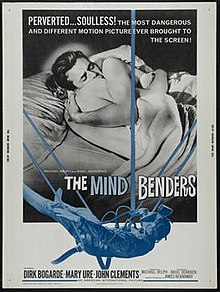Loading AI tools
1963 British film by Basil Dearden From Wikipedia, the free encyclopedia
The Mind Benders is a 1963 British thriller film produced by Michael Relph, directed by Basil Dearden and starring Dirk Bogarde, Mary Ure, John Clements, Michael Bryant and Wendy Craig.[2][3] Screenwriter James Kennaway turned his screenplay into his 1963 novel of the same name.
| The Mind Benders | |
|---|---|
 U.S. theatrical poster | |
| Directed by | Basil Dearden |
| Written by | James Kennaway |
| Based on | The Mindbenders 1963 novel by James Kennaway |
| Produced by | Michael Relph |
| Starring | Dirk Bogarde Mary Ure John Clements Michael Bryant |
| Cinematography | Denys N. Coop |
| Edited by | John D. Guthridge |
| Music by | Georges Auric |
Production company | Novus (Michael Relph Productions) |
| Distributed by | Anglo-Amalgamated (UK) AIP (USA) |
Release dates |
|
Running time | 109 min |
| Country | United Kingdom |
| Language | English |
| Budget | £210,781[1] |
American International Pictures released the film in the U.S. as a double feature with Operation Bikini (1963).
Professor Sharpey, working in a university research laboratory, is suspected of passing secrets to the Soviet Union and commits suicide. British intelligence believe that his suicide was the result of shame over his betrayal of his country. However, Sharpey's former colleague Doctor Longman believes that the sensory-deprivation experiments that Sharpey was conducting on himself may have rendered him susceptible to brainwashing. He volunteers to undergo the same tests in order to prove his theory. An intelligence officer and a colleague test the theory by trying to brainwash Longman against his beloved wife.[4]
In a contemporary review for The New York Times, critic Howard Thompson called the film an "experiment that doesn't hold water" and wrote: "Credit the Dearden-Relph unit for a smoothly machined drama, not entirely convincing but at least original...[T]he film slides downhill toward the conclusion that love conquers all, even science. The finale is a highly circumstantial childbirth. Mr. Bogarde, whose coiled, jittery behavior has no place in a 'top secret' laboratory, also murmurs something about experimental freedom."[5]
In a modern-day review, TV Guide called the film "a strange movie that leaves a deeper impression than one might expect due to the originality of the plot and the tense direction. It is the direct predecessor of Altered States."[6]
The film was a box-office disappointment.[7]
Seamless Wikipedia browsing. On steroids.
Every time you click a link to Wikipedia, Wiktionary or Wikiquote in your browser's search results, it will show the modern Wikiwand interface.
Wikiwand extension is a five stars, simple, with minimum permission required to keep your browsing private, safe and transparent.